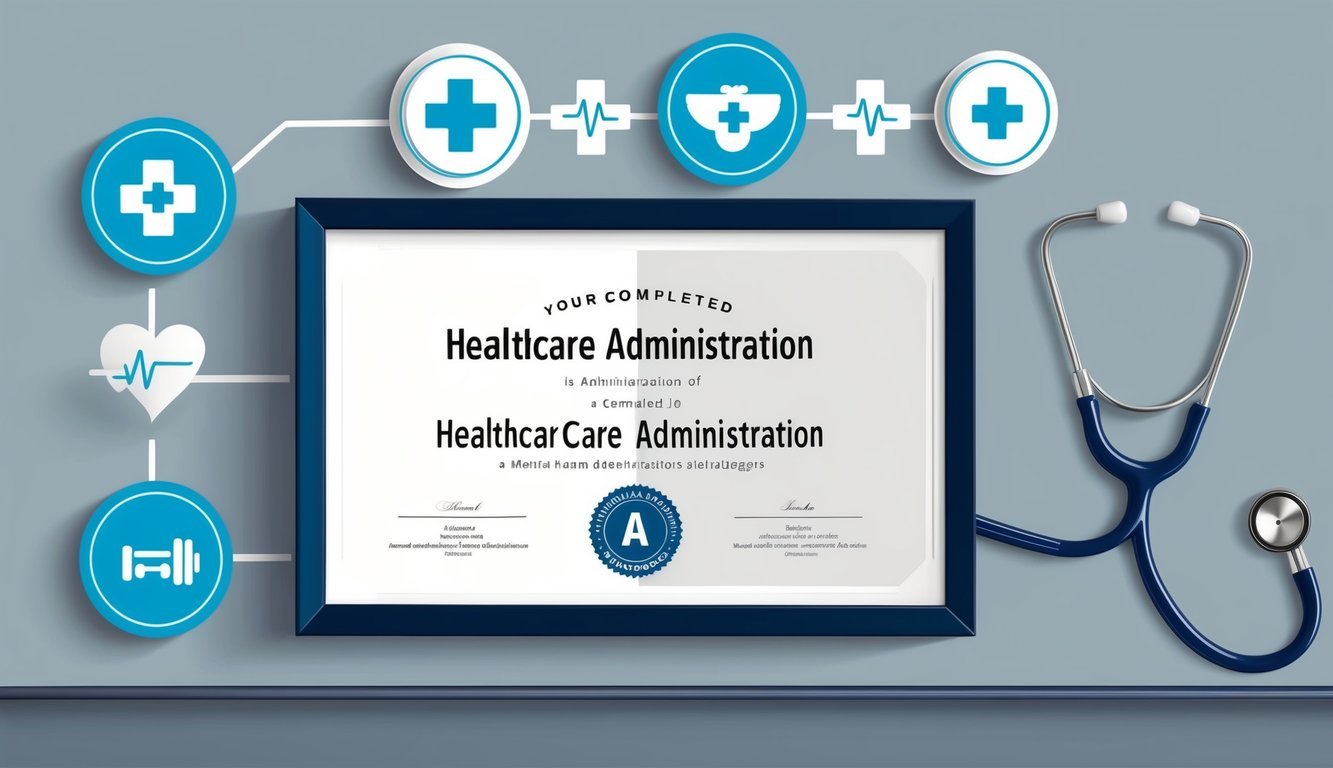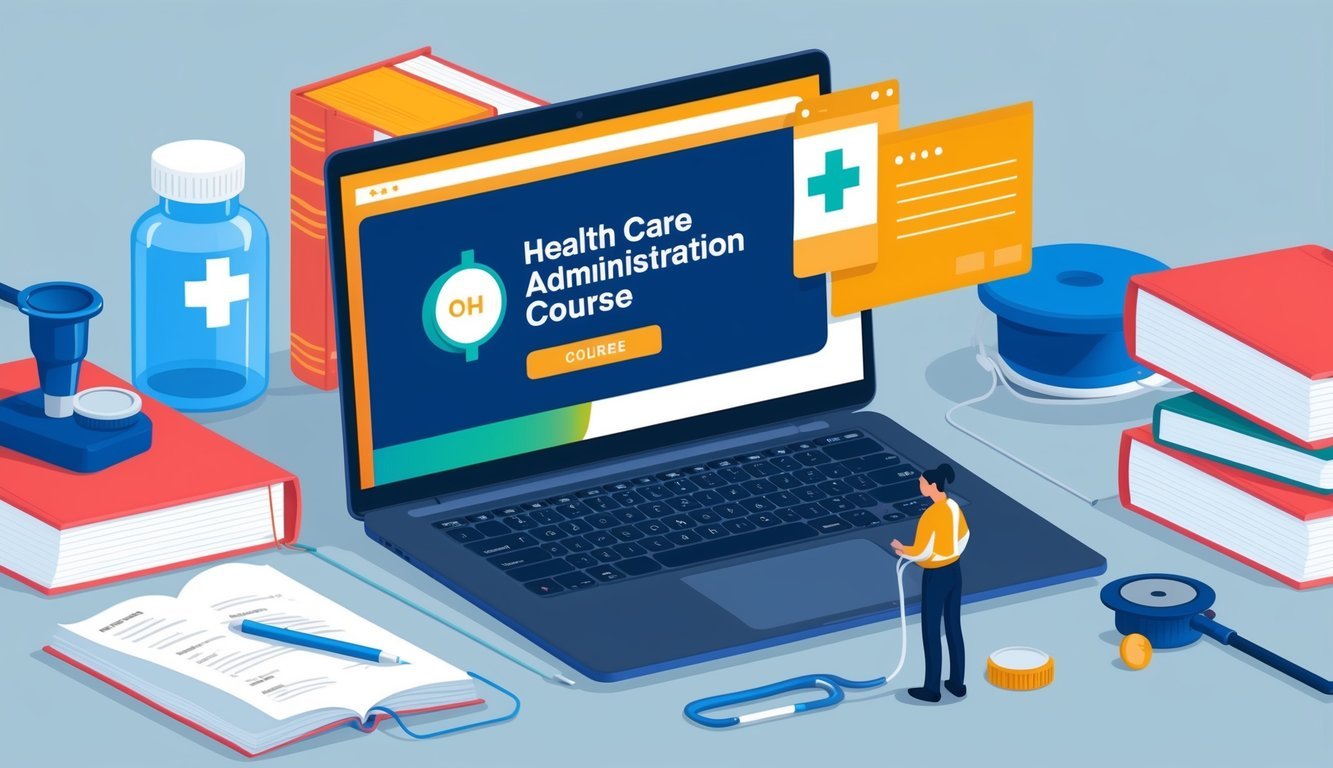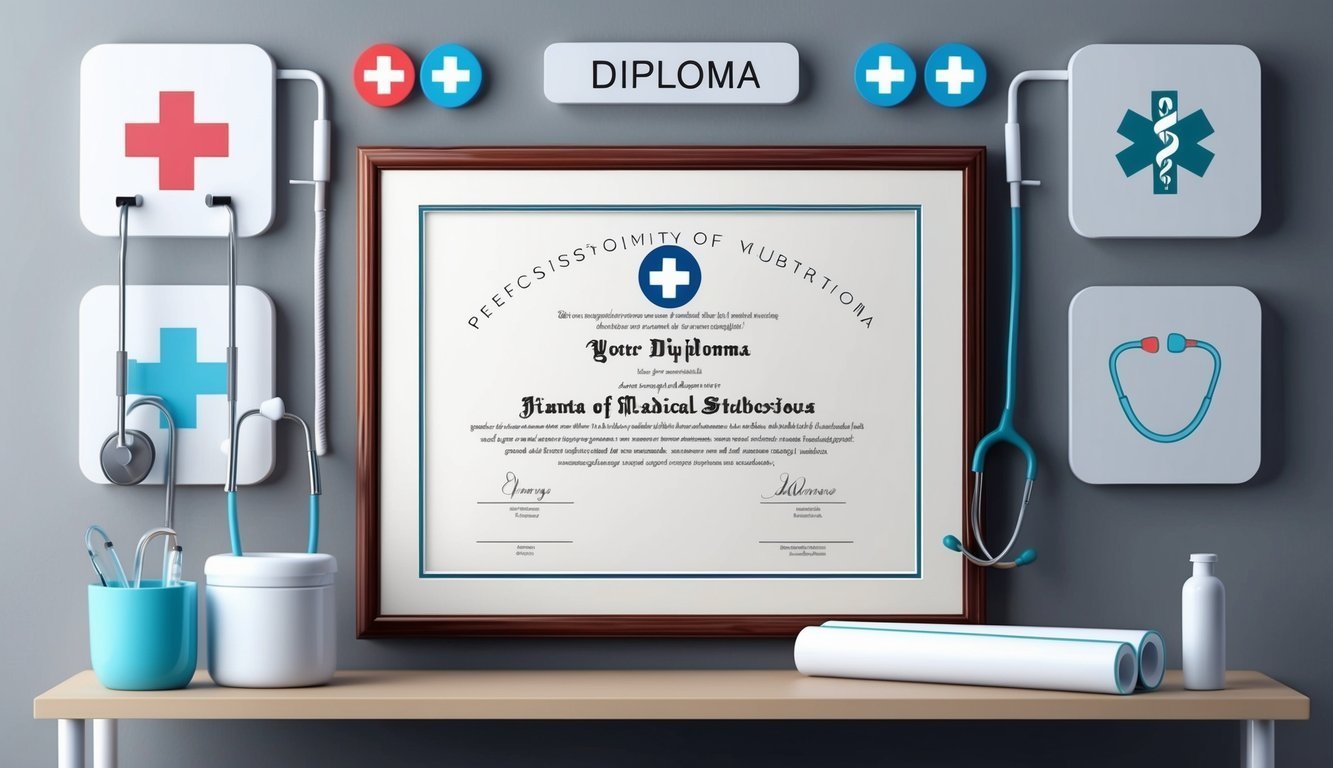A Bachelor of Arts in Health Care Administration prepares you for a rewarding career in the ever-evolving healthcare field. This degree equips you with essential skills in management, policy, and public health, making you a valuable asset in various healthcare settings.
With a focus on liberal arts, you will study the intricacies of health systems and learn how to address complex healthcare challenges.
In this program, you will explore various aspects of healthcare administration, including finance, regulation, and community health.
This knowledge is critical as the healthcare industry faces new regulations and demands for quality care.
Online programs offer flexibility, allowing you to balance your education with personal and professional commitments while gaining practical experience.
If you are drawn to making a difference in healthcare, pursuing a Bachelor of Arts in Health Care Administration can open up numerous career pathways, from hospital administration to policy analysis.
The skills and knowledge you gain will position you for success in a field that is constantly growing and changing.
Key Takeaways
- A Bachelor of Arts in Health Care Administration focuses on essential management and policy skills.
- Online education options provide flexibility for your learning journey.
- Graduates can pursue various career opportunities within the healthcare sector.
Understanding Healthcare Administration

Healthcare administration is a crucial field that focuses on managing healthcare organizations effectively.
It involves various roles and responsibilities aimed at ensuring that healthcare services run smoothly.
You will learn about the essential aspects of healthcare administration and the underlying structures that support it.
Defining the Role of Healthcare Administrators
Healthcare administrators, also known as medical and health services managers, play a vital role in overseeing healthcare facilities.
They work to improve efficiency, quality of care, and patient satisfaction.
Their responsibilities include:
- Managing Staff: Administrators oversee hiring, training, and performance evaluations of healthcare workers.
- Budgeting and Finance: They ensure that the healthcare organization remains financially stable by managing budgets and expenditures.
- Policy Implementation: Administrators ensure that the organization complies with healthcare laws and regulations.
- Quality Assurance: They develop programs to maintain high standards of care for patients.
Having a solid understanding of these tasks is essential for anyone pursuing a career in healthcare administration.
Healthcare Systems and Organizational Structures
Healthcare systems are made up of various components that work together to deliver services.
This typically includes hospitals, clinics, nursing homes, and other settings.
In healthcare organizations, you may find different structures, such as:
- Hierarchical Models: Traditional structures with clear lines of authority.
- Matrix Models: Combining functional and project-based setups for flexibility.
These structures affect how services are delivered and how teams work together.
Understanding these systems can help you navigate the complexities of the healthcare field more effectively.
You can learn more about healthcare systems and their impact on administration.
Academic and Admission Information

When pursuing a Bachelor of Arts in Health Care Administration, understanding academic requirements and admission processes is crucial.
This section covers the essential prerequisites for entering the program and how to navigate financial aid options.
Program Prerequisites and Requirements
To enroll in a Bachelor of Arts in Health Care Administration, specific prerequisites must be met.
Typically, you should have a high school diploma or an equivalent qualification.
Key requirements often include:
- Completed online application: Fill out the application form on the university’s website.
- Official transcripts: Submit transcripts from high school and any colleges attended.
- Minimum GPA: Some institutions require a GPA of 2.70 or higher for admission.
You may also discuss transfer credits with your admissions advisor.
This can help you apply previously earned college credits toward your degree.
Navigating Financial Aid and Scholarships
Understanding financial aid options is essential to manage your education costs.
Many universities offer various types of aid, including grants, loans, and scholarships.
Options include:
- Federal financial aid: Complete the FAFSA form to determine your eligibility.
- Scholarships: Look for scholarships specifically for healthcare administration students.
Additionally, check with your school’s financial aid office for scholarship opportunities and deadlines.
Make sure to gather all necessary documents, including your official transcripts, for the application process.
For more information on financial assistance, visit sites like Studentaid.gov for federal aid options or check your university’s scholarship page.
Core Curriculum and Concentrations

The core curriculum in a Bachelor of Arts in Healthcare Administration equips you with essential skills needed in the healthcare industry.
You will study key subjects that provide foundational knowledge, while also having the opportunity to specialize in various areas through elective courses and concentrations.
Key Disciplines in Healthcare Administration Education
The core curriculum typically includes courses in essential disciplines such as:
| Discipline | Description |
|---|---|
| Economics | Understand financial principles applied to healthcare. |
| Public Health | Learn about health promotion and disease prevention. |
| Healthcare Policy | Study policies that shape healthcare delivery systems. |
| Information Systems | Gain insights into health information technology. |
| Health Information Management | Manage healthcare data responsibly, focusing on quality and compliance. |
These disciplines help you develop critical thinking and analytical skills necessary for effective decision-making in your future role.
Specialty Tracks and Electives
Choosing a concentration or specialty track allows you to focus on a specific area of interest.
Common options may include:
- Healthcare Management: Focuses on leadership and organizational skills.
- Healthcare Policy and Advocacy: Prepares you to influence health policies.
- Health Informatics: Combines healthcare and information technology to enhance data management.
Electives can further tailor your education in areas like programmatic accreditation or health finance.
This flexibility allows you to align your education with your career goals, preparing you for a diverse range of roles in the healthcare sector.
This structure enhances your employability and expertise in your chosen field.
Developing Essential Skills and Competencies

In healthcare administration, developing key skills is crucial for your success.
Focusing on leadership, critical thinking, and ethics can enhance your ability to navigate complex healthcare environments.
Leadership and Management in Healthcare
Effective leadership is vital in healthcare.
You will need to motivate teams, manage conflicts, and inspire change.
Strong leadership skills often include:
- Communication: Clearly conveying ideas and policies to staff.
- Team Building: Fostering a collaborative environment.
- Vision: Setting long-term goals for improvement.
Understanding management principles is also important.
You must be familiar with healthcare policies and regulations that guide operations.
The ability to lead diverse teams and implement change makes a significant difference in patient care quality.
Resources like the American College of Healthcare Executives can provide further guidance on developing these skills.
Critical Thinking and Decision Making
Critical thinking involves analyzing situations and making informed decisions.
In your role, you will face challenges where quick, effective decisions are necessary.
Key aspects include:
- Data Analysis: Interpreting data to guide decisions.
- Problem-Solving: Addressing issues proactively rather than reactively.
- Evaluating Options: Weighing pros and cons of various approaches.
Your decisions can impact patient outcomes and organizational efficiency.
For help with decision-making processes, consider exploring resources like Institute for Healthcare Improvement.
Ethics and Healthcare Law
Understanding ethics is essential in healthcare.
You will encounter various ethical dilemmas, often influenced by healthcare laws and policies.
Focus on:
- Confidentiality: Upholding patient privacy rights.
- Informed Consent: Ensuring patients understand their treatment options.
- Regulatory Compliance: Following laws governing healthcare practices.
Ethical policies guide you in making decisions that respect patient rights and promote trust.
Staying informed on current healthcare laws is crucial for effective administration.
For more insights, visit resources like the American Medical Association.
Career Pathways in Health Care Administration
The field of health care administration offers various career paths with significant job prospects and opportunities for professional growth.
Pursuing continuing education can further enhance your career options and earning potential.
Job Prospects and Growth Potential
As a graduate with a Bachelor of Arts in Health Care Administration, you can explore many job roles.
Some of the key positions include:
| Job Title | Median Salary | Job Growth Rate (2022-2032) |
|---|---|---|
| Medical and Health Services Manager | $104,830 | 32% |
| Nursing Home Administrator | $93,640 | 12% |
| Health Information Manager | $101,240 | 7% |
| Clinical Manager | $82,000 | 28% |
| Community Service Manager | $69,600 | 17% |
These roles reflect the growing need for skilled professionals in health care.
The aging population and an increasing focus on health care delivery systems drive this demand.
As you enter this field, you can expect a competitive salary and various opportunities for advancement.
Continuing Education and Professional Development
To enhance your skills and expand your career options in health care administration, consider pursuing additional certifications or advanced degrees.
Relevant qualifications include:
- Certified Health Care Manager (CHCM)
- Fellow of the American College of Healthcare Executives (FACHE)
- Health Care Administration Master’s Programs
Participating in workshops and training programs can also boost your knowledge and expertise.
Many industry organizations offer resources that can help you stay updated with trends and best practices.
Engaging in networking opportunities within professional organizations can connect you with other health care professionals, further advancing your career.
Explore resources like BestColleges and Forbes for additional guidance.
Online Education and Advancements

Online education in healthcare administration offers flexibility and accessibility that can significantly enhance your learning experience.
With advanced technology and interactive platforms, you can engage deeply with course content while balancing other commitments.
Benefits of an Online Degree in Healthcare Administration
Choosing an online degree in healthcare administration provides numerous advantages.
You can often study at your own pace and complete coursework from anywhere, fitting your education into your life without the need for relocation.
Many programs offer access to materials 24/7, allowing you to review lectures and resources whenever you need.
Additionally, online healthcare administration programs frequently emphasize practical skills relevant to today’s healthcare environment.
Through simulations and case studies, you gain insights into management practices that will prepare you for roles in health organizations.
Many of the best online bachelor’s in healthcare administration also prioritize student support, offering resources like tutoring and career services.
This commitment to your academic success helps to create a productive learning environment.
Technology and Interactive Learning Platforms
Online learning utilizes innovative technology to create an interactive educational experience.
Platforms often incorporate videos, discussion boards, and virtual classrooms.
These make it easier to engage with instructors and peers.
You may find features like live chats and group projects enhance your communication skills, vital for healthcare settings.
Technical tools can also streamline collaboration with classmates, helping you build a professional network.
Furthermore, online programs frequently utilize state-of-the-art learning management systems.
These systems keep everything organized, housing course materials, assignments, and feedback in one convenient location.
Frequently Asked Questions
In this section, you will find clear answers to common questions about pursuing a Bachelor of Arts in Health Care Administration.
This includes career opportunities, salary comparisons, academic requirements, online options, benefits of this degree versus an Associate’s, and further education paths.
What are the career opportunities after obtaining a Bachelor of Arts in Health Care Administration?
With a Bachelor of Arts in Health Care Administration, you can explore various career paths.
Common roles include:
| Position | Description |
|---|---|
| Healthcare Manager | Oversees operations in healthcare facilities. |
| Health Services Administrator | Manages health services in hospitals or clinics. |
| Policy Analyst | Evaluates healthcare policies for effectiveness. |
| Health Information Manager | Manages patient data and health information systems. |
| Practice Manager | Oversees daily operations in medical practices. |
These roles can be found in hospitals, clinics, governmental agencies, and nonprofit organizations.
How does a degree in Health Care Administration compare to other healthcare degrees in terms of salary?
Salaries can vary widely based on job roles and locations.
Here is a basic comparison:
| Degree Type | Average Salary |
|---|---|
| Bachelor of Arts in Health Care Administration | $65,000 – $80,000 |
| Associate Degree in Health Administration | $40,000 – $55,000 |
| Master’s in Health Administration | $85,000 – $110,000 |
Generally, higher degrees lead to higher salaries and positions.
What are the academic prerequisites for enrolling in a Bachelor of Arts in Health Care Administration program?
To enroll in this program, you typically need:
- A high school diploma or equivalent.
- Completion of introductory courses in biology, healthcare, and business.
- A minimum GPA requirement, often around 2.5 to 3.0.
Some programs may also require a personal statement or letters of recommendation.
Can one pursue a Health Care Administration degree entirely online, and if so, how does it differ from in-person programs?
Yes, many universities offer this degree online.
Online programs provide flexibility in scheduling.
Key differences include:
- Interaction: In-person programs may have more direct interaction with professors and peers.
- Format: Online courses often use video lectures and discussion boards.
- Self-discipline: Online students need strong time management skills to keep up.
Both formats aim to deliver the same curriculum content.
What are the potential benefits of pursuing a Bachelor of Arts in Health Care Administration versus an Associate’s degree?
Choosing a Bachelor’s degree has several advantages:
- Higher earning potential: Bachelor’s graduates typically earn more than those with an Associate’s degree.
- Broader job opportunities: Many management and administrative roles require a bachelor’s level education.
- Advanced education options: A bachelor’s allows you to pursue master’s programs, enhancing your qualifications.
These factors can significantly affect your career path.
What are the advanced education options after completing a Bachelor of Arts in Health Care Administration?
After earning your bachelor’s degree, you can consider:
- Master’s in Health Administration (MHA): This degree focuses on advanced management skills.
- Master’s in Public Health (MPH): It concentrates on public health policies and practices.
- Doctorate in Health Administration (DHA): This degree is for those interested in high-level administrative roles or academia.
These advanced degrees can open doors to leadership positions in the healthcare field.

